Technology
National Blockchain Framework
Strengthening Governance through Blockchain Technology
Posted On:
24 OCT 2025 10:38AM
Key Takeaways
- National Blockchain Framework was launched in September 2024 with a ₹64.76 crore budget.
- National Blockchain Framework core components include Vishvasya Blockchain Stack, NBFLite, Praamaanik, and the National Blockchain Portal.
- The Blockchain Technology Stack is deployed across NIC data centres in Bhubaneswar, Pune, and Hyderabad.
- Over 34 crore documents verified on the blockchain platform, as of 21 October 2025.
Introduction
Emerging from its early association with cryptocurrencies, Blockchain technology has evolved into one of the most transformative digital innovations of the 21st century. Unlike technologies such as Artificial Intelligence (AI), which derive their strength from computational power, blockchain’s value lies in its ability to establish verifiable trust without intermediaries.
India’s current governance systems often rely on centralized databases, which can be prone to errors, fraud, and lack of transparency. Blockchain technology addresses these challenges through its tamper-resistant, distributed ledger system, where records are securely maintained across multiple nodes. This design makes unauthorized modifications virtually impossible and significantly enhances data integrity and trust.
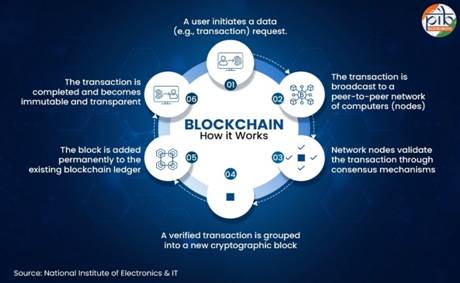
Recognizing its vast potential, the Ministry of Electronics and Information Technology (MeitY) has developed the National Blockchain Framework (NBF) to provide a unified architecture for deploying blockchain solutions across various sectors. The NBF aims to guide the integration of blockchain into public service delivery, ensuring greater transparency, accountability, and efficiency.
What is Blockchain?
Blockchain is a distributed, transparent, secure, and immutable database that functions like a ledger of records or transactions, resistant to tampering and accessible across a network of computers.
Understanding Types of Blockchain
- Public Blockchain:In this network, all nodes can access records, verify transactions, perform proof-of-work, and add new blocks.
- Private Blockchain:It is a permissioned blockchain, restricted to selected participants within an organization. The controlling entity determines the levels of security, authorization, and access, making it ideal for governmentapplications. By design, it enhances trust among participants while ensuring data confidentiality and operational efficiency.
- Consortium Blockchain:In this network, the blockchain is semi-decentralized, governed jointly by multiple organizations for shared data management and validation.
- Hybrid Blockchain:It is a blend of public and private blockchains allowing selective data access.
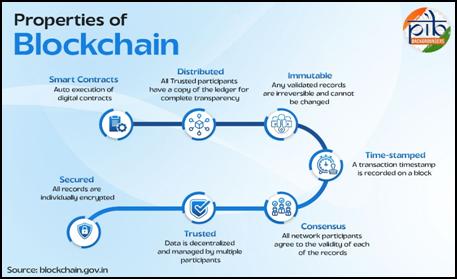
Blockchain’s foundational strengths—transparency, immutability, decentralization, and trust—are central to the National Blockchain Framework. These characteristics enable secure and efficient digital systems, and are particularly critical in transforming governance, enhancing citizen services, and reducing administrative frictio
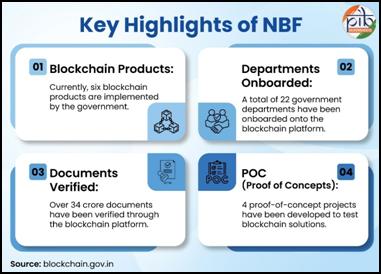
National Blockchain Framework: India’s Indigenous Platform for Secure and Scalable Digital Governance
The National Blockchain Framework (NBF), initiated in March 2021 with a budget outlay of ₹64.76 crore, reached a significant milestone with its official launch on 4 September 2024. NBF is designed to accelerate the development and deployment of permissioned blockchain-based applications, marking a strategic step towards building a secure, transparent, and scalable digital infrastructure for India.
Technology Stack – Vishvasya Blockchain Stack
At the core of the National Blockchain Framework is the Vishvasya Blockchain Stack.
It is an indigenous and modular platform designed to provide the technical foundation for building and deploying blockchain-based applications for governance.The features of Vishvasya Blockchain Stack are:
- Blockchain-as-a-Service (BaaS):Vishvasya provides blockchain infrastructure as a shared service.This allows government entities to deploy blockchain-based applications without the need to create or manage their own infrastructure.
- Distributed Infrastructure:The stack is deployed across NIC data centres located in Bhubaneswar, Pune, and Hyderabad.This distributed network architecture ensures fault tolerance, scalability, and resilience for blockchain-based applications.
- Permissioned Blockchain Layer:The platform is built on a permissioned blockchain, ensuring that only verified and authorized participants can join or validate transactions.
- Open APIs and Integration Services:Vishvasya provides open APIs (Application Programming Interfaces) and integration modules for authentication and data exchange.
These features enable seamless integration with e-Governance platforms.
NBFLite - Blockchain Sandbox for Startups and Academia
NBFLite is a sandbox version of the blockchain technology stack, designed to encourage innovation, experimentation, and capacity building. It allows startups, research institutions, and students to prototype blockchain-based applications in a controlled environment without requiring full-scale deployment.It comes bundled with smart contract templates in key governance and industry domains such as Supply Chain and Digital Certificates, enabling users to quickly develop and validate applications.
Praamaanik – Innovative Blockchain Solution for App Verification
In today’s rapidly evolving digital landscape, it is vital to protect mobile devices from malicious apps and fraudulent customer support, as these threats can compromise personal data and cause financial losses. Praamaanik is an innovative solution that leverages blockchain technology to verify the authenticity and source of mobile applications. When users scan or check an app, Praamaanik matches the details with blockchain records to validate its legitimacy, thereby fostering trust and transparency within the mobile ecosystem.
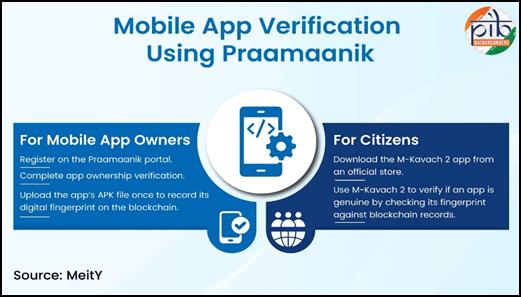
National Blockchain Portal
The National BlockchainPortal outlines India’s strategic approach to adopting blockchain technology in governance and industry. The platform supports innovation, standardization, and cross-sector adoption of blockchain for applications, fostering trust and enhancing India’s leadership in emerging technologies.India's NBF is one of the few state-led initiatives in the world to support blockchain technology across multiple industries.
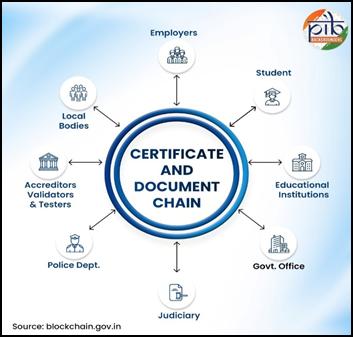
Blockchain-Enabled Chains Transforming Governance, Supply Chains, and Justice Systems
India’s journey towards a trusted digital economy is being steered by coordinated efforts of key regulators and technology enablers. NBF provides the core infrastructure for blockchain adoption across governance, supply chains, and enterprises.
Certificates and Document Chain
The current system for issuing and using certificates encounters challenges such as use of fraudulent documentsand delays in service delivery. To overcome these challenges, the National Informatics Centre (NIC) has adopted Blockchain technology to build a ‘Certificate Chain’ for secured storage and retrieval of such records.
A use case of this certificate chain is the academic documents of the Central Board of Secondary Education being stored in the Blockchain.
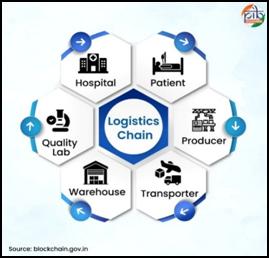
Similarly, Document Chain is a single platform that provides the issuing authorities and consuming entities a standard procedure for the storage and retrieval of any document issued by the government such as caste, income, ration card, driving license, birth & death certificates etc. Over 34 crore documents have been securely verified through India’s Blockchain-based platform out of which over 48,000 documents are of Document Chain, as of 21 October 2025.
Logistics Chain
The Logistics Chain provides a secure and transparent platform for tracking the movement of goods or resourcesacross multiple stakeholders. Using blockchain technology, all transactions in the supply chain are recorded in a tamper-proof ledger, ensuring traceability and accountability at every stage.One of the use cases of Logistics chain is the Online Supply Chain Management System for medicines (Aushada) of Karnataka.
The Aushada system is integrated with Blockchain to record the transactions related to movement of drugs from the manufacturer to the hospitals including quality checks.Patients can check the details of the manufacturer, expiry details & quality of the medicine before consumption. It provides traceability in the transactions (track & trace) reducing the chances of entry of spurious drugs, enhances precision and brings transparency.
Judiciary Chain
The Judiciary Chain leverages blockchain to enhance transparency, efficiency, and trust within the justice system by providing a secure, immutable, and time-stamped record of judicial data and documents.Blockchain facilitates electronic delivery of notices, summons, and bail orders, reducing delays and eliminating manual dependencies. A total of 665 judiciary documents have been verified on the blockchain platform, as of 21 October, 2025.
Inter-Operable Criminal Justice System
Building on the Judiciary chain, the Inter-operable Criminal Justice System (ICJS)integrates the criminal justice ecosystem. This ensures a unified digital platform for case records, evidence, and judicial documents.Over 39,000 ICJS documents have been verified on the blockchain platform, as of 21 October 2025.
Property Chain
The Blockchain-powered Property Management System ensures that every property transaction is securely recorded on the blockchain. Even during updates or transfers in land records, all stakeholders can access the complete transaction history before making decisions. This transparency helps prospective buyers verify ownership, rights, and liabilities, significantly reducing litigation and expediting dispute resolution. As of 21 October 2025, over 34 crore property documents have been verified through the blockchain platform.
Strategic Roadmap and Regulatory Initiatives for Blockchain Adoption in India
The National Strategy on Blockchain developed by MeitY, outlines a roadmap for the development of Blockchain technology in India. It addresses challenges and sets short-term and long-term goals for Blockchain integration across various domains.
Centre Of Excellence (CoE) in Blockchain Technology (BCT)
The National Informatics Centre (NIC) has established a Centre of Excellence (CoE) to serve as a platform for government departments to receive consultancy, training, and support for developing pilot projects (Proof of Concepts) before full-scale implementation.
The CoE provides blockchain-related services and ICT (Information and Communication Technology) infrastructure that help departments connect their systems and use Blockchain Technology (BCT) effectively. It has worked with popular blockchain platforms such as Hyperledger Sawtooth, Hyperledger Fabric, and Ethereum—which are open-source systems used to build secure and transparent digital networks.
Role of Telecom Regulatory Authority of India (TRAI) in BCT
TRAI has integrated blockchain-based Distributed Ledger Technology (DLT) into the telecom ecosystem, mandating all Principal Entities (PEs) and Telemarketers (TMs) to register their message transmission chains, enabling end-to-end tracking of SMS from origin to delivery. This initiative, implemented in collaboration with regulators and access providers, has significantly strengthened consumer protection, reduced spam, and demonstrated the effectiveness of blockchain in enforcing regulatory compliance and digital trust.This large-scale deployment covering over 1.13 lakh entities was executed collaboratively with RBI, SEBI, NIC, and C-DAC.
Role of Reserve Bank of India in BCT
The Reserve Bank of India (RBI) is leveraging blockchain technology to modernize India’s financial system through pilot projects such as the Digital Rupee (e₹). The retail pilot, launched in December 2022 within a closed user group of customers and merchantsdemonstrates how blockchain enables instant, traceable, and transparent payments while promoting financial inclusion and innovation in payment systems.
NSDL’s Adoption of Blockchain for Debenture Covenant Monitoring
The National Securities Depository Limited (NSDL), India’s largest depository, has introduced a Distributed Ledger Technology (DLT)–based blockchain platform for Debenture Covenant Monitoring, marking a major step in modernizing India’s capital markets. The platform enables issuers and debenture trustees to record asset charges, monitor asset cover ratios, and track covenants on a secure digital ledger.This ledger is tamper-proof, cryptographically signed, and time-stamped, creating a verifiable audit trail and enhancing investor confidence.
Capacity Building Initiatives in Blockchain Technology
To foster a skilled talent base in emerging technologies like blockchain, the Ministry of Electronics and Information Technology (MeitY) has launched several capacity-building programmes focused on blockchain. These initiatives aim to create a future-ready workforce.
Skill Development Programme
The Capacity Building Division of Digital India Corporation (MeitY) has undertaken Skill Development Programmes for Government Officials to enhance technological proficiency across departments. Over 214 programmes have trained 21,000+ officials in emerging domains such as Blockchain. Supported by State e-Mission Teams (SeMTs), these initiatives are fostering a future-ready government workforce equipped to drive technology-led governance.
Post Graduate Diploma in FinTech & Blockchain Development (PG-DFBD):
The rise of cryptocurrencies, NFTs (non-fungible tokens), and other blockchain applications has increased demand for faster, cheaper, and more secure platforms, driving growth in the FinTech ecosystem. To meet this demand, programs like the Post Graduate Diploma in FinTech & Blockchain Development (PG-DFBD) provide professionals and students with a comprehensive 900-hour curriculum covering Blockchain, FinTech, AI/ML, cybersecurity, programming, and regulatory frameworks.
BLEND: C-DAC Online Course
The BLEND programme, offered by the Centre for Development of Advanced Computing (C-DAC), is an online course aimed at engineering students and early-career professionals to build proficiency in Blockchain technology and its practical applications. The course is designed to provide a comprehensive understanding of Blockchain concepts, architecture, components, and operational mechanisms, while enabling participants to develop real-world Blockchain applications across diverse sectors.
FutureSkills PRIME
FutureSkills PRIME (Programme for Re-skilling/Up-skilling of IT Manpower for Employability) is an industry-oriented initiative sponsored by the Ministry of Electronics and Information Technology (MeitY). The programme aims to equip India’s workforce with digital capabilities in ten emerging technologies like blockchain, to enhance employability and strengthen the nation’s tech talent pool.
Way Forward: Future Blockchain Use Cases
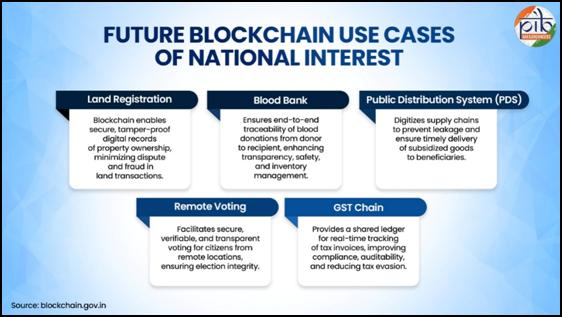
Various blockchain-based use cases are being studied across sectors to enhance efficiency and trust in public services. These initiatives show how blockchain can drive innovation in governance, ensuring accountability and reducing systemic inefficiencies. Key Proof of Concepts (POCs) include Land Records for secure ownership records, Blood Bank for transparent donation tracking, GST Chain for real-time tax monitoring, and Public Distribution System (PDS) for secure supply chains.
Conclusion
In line with the vision of Digital India and Aatmanirbhar Bharat, blockchain technology is transforming how trust and transparency are embedded in digital governance. Through the National Blockchain Framework initiative, India is building an integrated and interoperableblockchain ecosystem that supports government-to-citizen (G2C) and government-to-business (G2B) services, while driving innovation and Aatmanirbharta in technology. With continued focus on capacity buildingand the development of indigenous blockchain solutions, India is poised to emerge as a global leader in leveraging blockchain for inclusive growth.
References
Ministry of Electronics and IT
Rajya Sabha
Ministry of Communications
Ministry of Finance
Digital India Corporation
National Informatics Centre
National Institute of Electronics & Information Technology
Centre of Excellence in Blockchain Technology
Download in PDF
****
SK/SA
(Backgrounder ID: 155672)
Visitor Counter : 459
Provide suggestions / comments